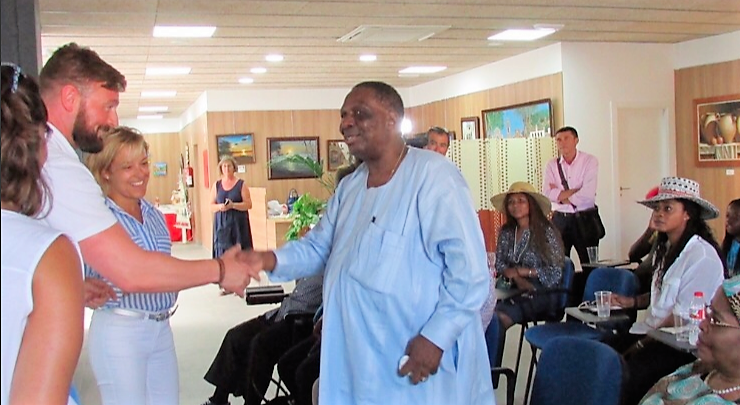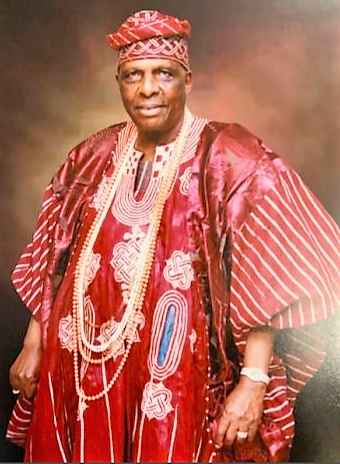Dipo Kehinde/
“There’s nothing a human being cannot achieve.”
These words often repeated by Chief Bode Akindele KJW, OFR, who died on June 29 would have been a befitting Epitaph for this very quiet businessman among the wealthiest and most enduring billionaire-industrialists in Africa.
Armed with just a secondary school education, the late Chief Bode Akindele sailed through the stormy seas of the business world like a Submarine, so strong yet not showy.
From the age of 20, when he registered his first company; until he died at 88, Akindele ran a business empire stretching across Africa, Europe, Asia, and the Americas.
For a man who controlled over one-third of the world’s Match market, owned one of the biggest indigenous conglomerates in Nigeria known as Modandola Group of companies with huge investments in manufacturing, real estate, maritime, finance, flour milling and agriculture; owned Fairgate Group a top-international company worth billions of pound sterling, dealing in real estate and property with headquarters on Bond Street, London in the United Kingdom, and also owned personal properties across the UK and substantial investments in the property market and top blue-chip companies in the United States, the late Chief Bode Akindele had done well for himself.
He could be described as a modern-day Marcus Garvey who made the black race proud, only that he didn’t dabble into Politics.
Fairgate owns several properties across the United Kingdom that are rented by some of the country’s foremost retail stores, such as Asda Wall-Mart and Sainsbury.
NewsmakersNG learnt that Chief Bode Akindele once humbled the first Chartered Accountant produced in Africa and doyen of the accountancy profession in Nigeria, Chief Akintola Williams.
When Williams made a submission at an event and Akindele rose to challenge him, silence descended on the hall. Akindele’s effrontery was a sacrilege.
One of his protégés, a Senior Advocate of Nigeria (SAN) who told the story, said, “He had no formal education but challenged Akintola Williams at an event and won.
“He said Akintola Williams was wrong and everybody was looking at him like what’s wrong with this man. By the time we finished, we found out that Akintola Williams was wrong. Chief was right.”
The SAN who once received a gift of $30million from the late Chief Bode Akindele, also mentioned how he paid a staff, Saliu Mohammed, $10,000 every day for 11 years. That’s $3.6million a year.
Born on June 2, 1932, the late old-generation industrialist was the Parakoyi of Ibadan-land, his home town in Oyo State. He was an exponent of high quality, undiluted Yoruba ensembles and he had a trademark Oyo-Ibadan cap-style known as “Ki Elenu So Enu (Mind your own business).
His mother, Alhaja Rabiatu Adedigba, who died in 1976, was a renowned wealthy and successful trader and opinion leader in Ibadan, the largest town in West Africa. She was the first woman from Ibadan to go on a pilgrimage to Mecca.
Chief Akindele’s first major business venture was in Sweden where he bought a Swedish matches manufacturing company which he later shut down, and gained full control of one-third of the Match world market.
His father, Pa Joshua Laniyan Akindele, was a Chief Tax Clerk for Western Region of Nigeria. He was also one of the pillars of the Methodist Church and Bode Akindele as a child used to carry the Bible on his head to church every Sunday
Chief Bode Akindele’s business empire operates under the name Modandola Group of Companies, named after his mother, which translates as ‘God, if you give me the wealth, give me a child that can take care of it.’
Subsidiaries of Modandola Group of Companies include Standard Breweries, Ibadan; Diamond Foods Ltd, Ibadan; United Beverages Ltd, Ibadan; Associated Match Industry, Ibadan, merged with Ilorin, Port-Harcourt and Lagos to form a company with a huge share of the Nigerian market and Standard Flour Mills in Lagos.
The late industrialist was not born with a silver spoon. His encounter with schooling began when he started assisting his elder brother to carry his school bag to Baptist School, Idikan, Ibadan, when they lived at Mapo area, trekking the distance. He later enrolled at Olubi Memorial School Ibadan. He attended Lisabi Commercial College, in Abeokuta for his secondary school education. Though he had wished to attend a Grammar School or Boys High School just like his friends, he was restricted due to his inability to pass the arm test. However, the business mogul believed that it was God who was preparing him for something great in life.
At the time, most parents wanted their children to become lawyers and doctors and for that reason, commercial education was a no go area as it was not so popular, but it was at the Commercial School that the late Akindele received the training that propelled him to build a successful business in life.
After completing his secondary school education, Akindele and some friends had nursed the idea of travelling to the United Kingdom to study Law, but the growth of his business activities eventually took precedence. Like his peers, he was given money to obtain a passport but rather than go for the international passport, the business inclined Akindele used the money to place an order for a sewing machine which he sold at a good profit.
He got his first paid employment in 1952, as secretary to an assistant district officer and later became a cadet manager with the United Africa Company (UAC), where he was an assistant to the expatriate manager in Oyo. Akindele left UAC Foods for the Western Nigerian Union of Importers and Exporters.
He realised that becoming a civil servant, which his father had desired, was not what he wanted to do. He had developed a good business orientation during his college days. He helped his mother who had a factory in the North where dried meat is prepared for the market in the South.
When he registered his first company at 20, he was sourcing for goods from anywhere in the world. He sold everything, including medicine, which he got from a pharmacy in Lagos.
He was one of two federal agents out of a dozen in Lagos for whom the produce trade was profitable. He bought land in Agege, a Lagos suburb and constructed 80ft by 350ft warehouse where he stockpiled and grade cocoa.
The importation of goods and the high volume of cocoa exports led to an interest in clearing and forwarding and road haulage. A company was later set up (Coastal Services Ltd.) and that led to the termination of patronage with Umarco and Panalpina.
Then, he became a shipping agent, chartering vessels in London and using old school connections with the National Bank of Nigeria which had opened a London office in 1956, to finance his transactions.
During the 1970s, the Group opened a large roll-on roll-off (RORO) terminal and warehousing operation at Tin Can Island port. The RORO Terminal Company was the managing agent of the Nigeria Ports Authority for RORO terminals in all Nigerian ports. The Group also started fishing venture after securing four trawlers from Ghana in 1971. Obelawo Farcha Fishing Industries Ltd currently has a fleet of 28 trawlers and five shrimpers.
In the early 1980s, the Group expanded into boat building and ship repair as well as dry-dock facilities in a joint venture with Damen Shipyards of Holland.
Chief Akindele in partnership with some foreign country investors, was in the process of developing the largest privately owned seaport in Africa before his death.

A new phase in the development of the Group began with the start-up of manufacturing and process industries at Alomaja, a village very close to Ibadan. These included a large brewery, biscuit, plastics and soft-drinks (the largest single unit in Nigeria) factories, four-match factories acquired from Lebanese owners and a large flour mill with $80 million invested.
The group has also been active in construction, real estate and equity investment and farming. Its first experience in construction was a joint venture with DC Savage, an American company that built the US embassy in Lagos and the Lagos Durbar Hotel. Savage left Nigeria and the Modandola Group sustained some losses before it closed down operations. The Group opened a full service-advertising company, Oricom (Nig.) Ltd in 1983. Initially, the agency did well and made much publicity through the ‘Oricom Lectures’, sponsorship of beauty competitions and sporting events.
In 2001, when the Federal Government moved to privatize Nigeria’s state-owned telephone company, Nigerian Telecommunications Plc (NITEL), Chief Bode Akindele led some local investors under the name International Investors (London) Limited (IILL) in a bid to acquire 51 per cent shareholding in the national carrier. First Bank provided a credit facility of $131.7million to the investors.
The consortium had drawn up a five-year development programme for NITEL with spending estimated at $2billion. But the contract was terminated.
In 2003, a $237million judgement was entered against Nigeria by an arbitration panel in the United Kingdom, in a case filed by Chief Bode Akindele over the cancellation of the contract for the purchase of the defunct NITEL.
According to his lawyers, Bode Akindele successfully acquired NITEL for $237million, paid one-third of the sum, then the contract was terminated when he allegedly refused to cede some shareholding to some interests in government. The termination prompted a legal battle before the arbitration panel.
To honour his mother, the late philanthropist built the ARAMED Centre in Ibadan to assist the society. Just like the Modandola name was one of his mother’s names, ARAMED is also an acronym of his mother’s names. It stands for Alhaja Rabiatu Adedigba Medical Centre. It was regarded as the healing ministry of Bode Akindele Foundation that is chaired by Archbishop Ayo Ladigbolu.
He also built a magnificent estate in Alomaja on the outskirts of Ibadan in 1962, when he was just 29. His stately Ibiyemi Villa boasts of the most exotic chairs, artworks, chandeliers, and a beautifully decorated banquet hall.
He was a jazz-music aficionado.
Every year, more than 1,000 individuals benefit from the late industrialist’s philanthropic gestures.
Nobody knew he was the single largest donor to Oyo State COVID-19 Trust Fund until Governor Seyi Makinde revealed it after his death.
In his bid to empower youths and raise a crop of entrepreneurs who will shape Nigeria’s future, the Sir Bode Akindele Foundation – in collaboration with the Good Worker Ministries International, The University of Ibadan and the Federal University of Technology, Akure, put together a programme known as the Bode Akindele Yield Initiative (BAYI), to turn millions of youths into innovators, entrepreneurs and leaders.
BAYI planned to get other youths off drug abuse and other social vices, hoping to see a world of focused and well-oriented youths, promoting in them patriotism, godly values, leadership and entrepreneurial development.
The foundation also sponsored and financed many Nigerians, including clergies, to perform holy pilgrimages, provided succour for the poor and disabled, among others. And, it assisted in education and research.
Chief Bode Akindele’s children have also turned out successful in their fields of endeavour. One of them is Folake Folarin-Coker, a lawyer who caught the Fashion bug from her Dad and established a pioneering Nigerian Womenswear Brand in 1998 known as Tiffany Amber.
Chief Bode Akindele lost a daughter, Dasola Adetunji, in his lifetime, and he is survived by 10 daughters and a son – Bolaji.
The daughters are Toyin Isemede, Biola Aderibigbe, Shola Aridegbe, Biodun Duduyemi, Ajoke Braithwaite, Yemisi Oladapo, Titi Madedor, Folake Coker, Ayo Akindele, and Iyabo Shonibare.
0











